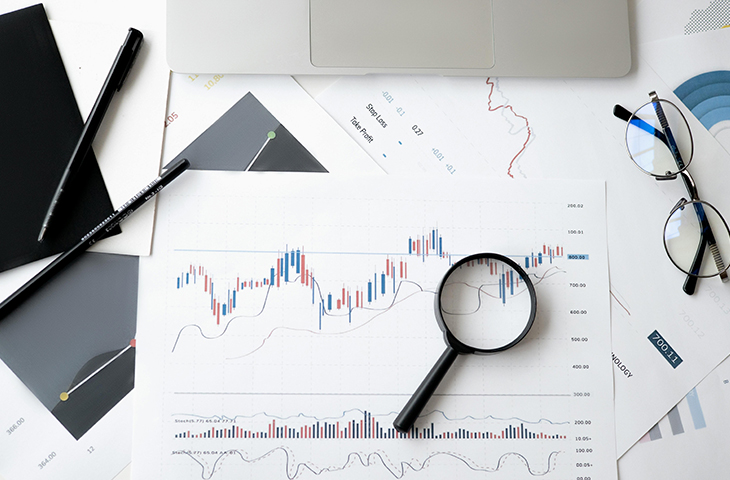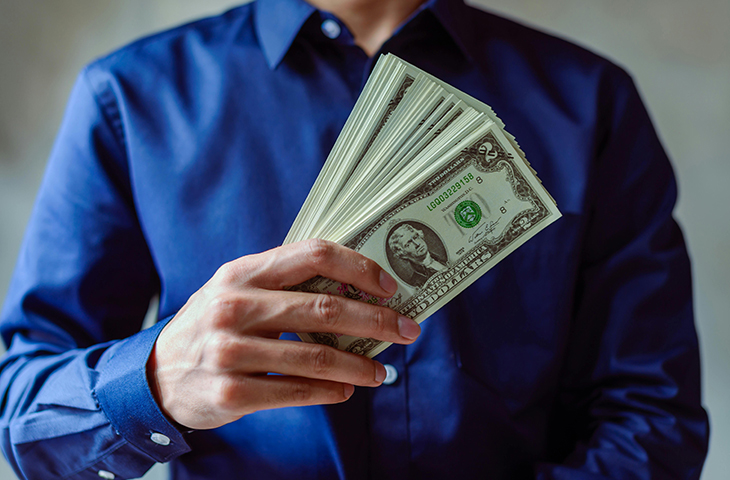Billionaire Bill Ackman Has 47% Of His Hedge Fund's $12.8 Billion Portfolio Invested In Just 3 Stocks

Bill Ackman is one of the best-known billionaires in the world of investing. As manager of his Pershing Square Capital hedge fund, he invests heavily in a handful of his best ideas.
Specifically, he's looking for companies whose stocks are mispriced relative to the long-term value of the company. He occasionally uses his influence to unlock that value, either through convincing other investors or putting pressure on a company's board to make some changes.
Where to invest $1,000 right now? Our analyst team just revealed what they believe are the 10 best stocks to buy right now. See the 10 stocks »
As part of his strategy, Ackman keeps a very concentrated portfolio. In fact, nearly half of Pershing Square's $12.7 billion equity portfolio is tied up in just three companies' stocks. They represent some of his best investment ideas right now.
1. Alphabet (17.7%)
Alphabet (NASDAQ: GOOG) (NASDAQ: GOOGL) is the parent company of Google, and many see the rise of artificial intelligence (AI) chatbots like ChatGPT and Perplexity as a major challenge to Google's dominance in internet search. Ackman, however, saw an opportunity to buy shares as investors kept the price low relative to other big techs.
He loaded up on over 9 million Class C shares and 4 million Class A shares in early 2023. He has trimmed his position since, but he still owns about 10.5 million shares of Alphabet across the two share classes, worth roughly $2.3 billion as of this writing.
Ackman's timing couldn't have been better. Alphabet shares hit a relative low at the end of 2022 and remained around those levels until it reported first-quarter earnings at the end of April in 2023. It turns out AI is very good for its business, specifically its cloud computing business.
Google Cloud became profitable in the first quarter of 2023, and it has gone on to see tremendous improvements in profitability as AI-driven demand has led to strong revenue growth and expanding operating margins. Operating earnings climbed to $2 billion in the third quarter of 2024 on the back of 35% year-over-year revenue growth.
Alphabet has also seen great success fending off AI chatbots with its own AI Overviews product, which provides AI generated answers to search queries. With advancements in its own large language model, Gemini, and technical breakthroughs on the hardware side, Google has been able to reduce the cost of AI Overviews by 90% since launching them in early 2023.
That's enabled it to expand the feature to more search queries. Management says the product has increased user satisfaction and engagement, effectively preventing Google from losing valuable traffic.
Despite the strong earnings results from Google Cloud and its core advertising business, the stock still trades at an attractive value. Investors can buy shares for less than 22 times analysts' consensus 2025 earnings expectations.
With strong expectations for continued double-digit growth in earnings per share, supported by a big capital return program, it's no wonder Ackman has kept it as a top holding.
Brookfield (14.9%)
Brookfield (NYSE: BN) is an alternative-asset management company with numerous publicly traded subsidiaries including Brookfield Renewable, Brookfield Renewable Partners, and Brookfield Asset Management. Its investments and businesses are spread out across renewable energy, infrastructure, business services, insurance, and real estate.
The complicated structure of Brookfield and its subsidiaries is all part of management's goal of unlocking shareholder value. For example, it created Brookfield Renewable as part of Brookfield Renewable Partners because many institutional investors aren't allowed to invest in limited partnerships, but they can buy common stock. That increased the pool of investors for its shares.
Likewise, it relocated the headquarters of Brookfield Asset Management to New York and made its 73% private stake in the business publicly tradable shares in order to make it eligible for inclusion in U.S. stock indexes.
These moves are in line with the types of things Ackman might push management to do for a company he views as trading well below its intrinsic value. And to that end, Brookfield arguably trades as a great value. That may be why Ackman loaded up on shares in 2024, holding 32.7 million by the end of September. Those shares are worth about $1.9 billion as of this writing.
Brookfield is on track to generate significant free cash flow growth over the next five years. Management expects to double assets under management at Brookfield Asset Management in that time frame. It also thinks insurance assets will nearly triple.
Combined with lower borrowing costs, it sees cash flow growing 20% annually, totaling $47 billion through 2029. Management plans to retain 75% of that cash to reinvest in existing and new businesses while returning the other 25% to shareholders.
At its 2024 analyst day, management said it could generate $9.77 per share in earnings by 2029, compounding at more than 20% per year. With shares trading for about 15 times its trailing-12-month distributable earnings per share, the stock looks like a great value.
Hilton Worldwide (14.3%)
Ackman started building a significant position in Hilton Worldwide (NYSE: HLT) in 2018 after holding shares for a short period in 2016. When he made the investment in 2018, he wrote to Pershing Square investors: "Hilton's extensive and growing network of brands and properties offers a significant and self-reinforcing value proposition to both guests and hotel owners, which creates a strong competitive moat around the business."
If anything, Hilton's ability to leverage its brand and loyalty program has become even stronger since then. The pandemic may have fueled that strength, as Ackman said in early 2020: "We also believe that the crisis will cause independent hotels to seek an affiliation with global brands like Hilton." It's worth noting that he added to Pershing's Hilton position in early 2020 amid the height of the pandemic.
While he has slowly sold off the position, Pershing Square owned 7.4 million shares at the end of September. Those shares are worth about $1.8 billion as of this writing.
Hilton's brand strength and network is exemplified by the fact that its recently launched Spark and LivSmart Studios brands have a few hundred partners lined up ready to join the portfolio. Total properties have grown to more than 8,300 with over 1.25 million rooms at the end of September. That's up from 5,700 properties and 913,000 rooms at the end of 2018.
It also has over 200,000 Hilton Honors loyalty members. The growing room count and growing member count create a network effect: With more members, more hotels want to join the Hilton portfolio, and vice versa.
Hilton is growing fast, with a 21% share of all rooms under construction in America. It expects total room count to reach 1.4 million by the end of next year.
Meanwhile, it's been able to fill those rooms at increasing rates, with revenue per available room climbing 1.4% in the third quarter. That number should climb faster as discretionary spending and travel continue to recover in 2025 and 2026.
With shares at an enterprise-value-to-EBITDA ratio of about 29, they currently trade on the higher end of their historic valuation (outside of 2020 and 2021). Even with strong expectations for earnings growth, investors may want to wait for a better price before following Ackman into Hilton shares.
Don’t miss this second chance at a potentially lucrative opportunity
Ever feel like you missed the boat in buying the most successful stocks? Then you’ll want to hear this.
On rare occasions, our expert team of analysts issues a “Double Down” stock recommendation for companies that they think are about to pop. If you’re worried you’ve already missed your chance to invest, now is the best time to buy before it’s too late. And the numbers speak for themselves:
- Nvidia: if you invested $1,000 when we doubled down in 2009, you’d have $357,084!*
- Apple: if you invested $1,000 when we doubled down in 2008, you’d have $43,554!*
- Netflix: if you invested $1,000 when we doubled down in 2004, you’d have $462,766!*
Right now, we’re issuing “Double Down” alerts for three incredible companies, and there may not be another chance like this anytime soon.
*Stock Advisor returns as of January 13, 2025
Suzanne Frey, an executive at Alphabet, is a member of The Motley Fool’s board of directors. Adam Levy has positions in Alphabet. The Motley Fool has positions in and recommends Alphabet, Brookfield, Brookfield Asset Management, and Brookfield Corporation. The Motley Fool recommends Brookfield Renewable and Brookfield Renewable Partners. The Motley Fool has a disclosure policy.


